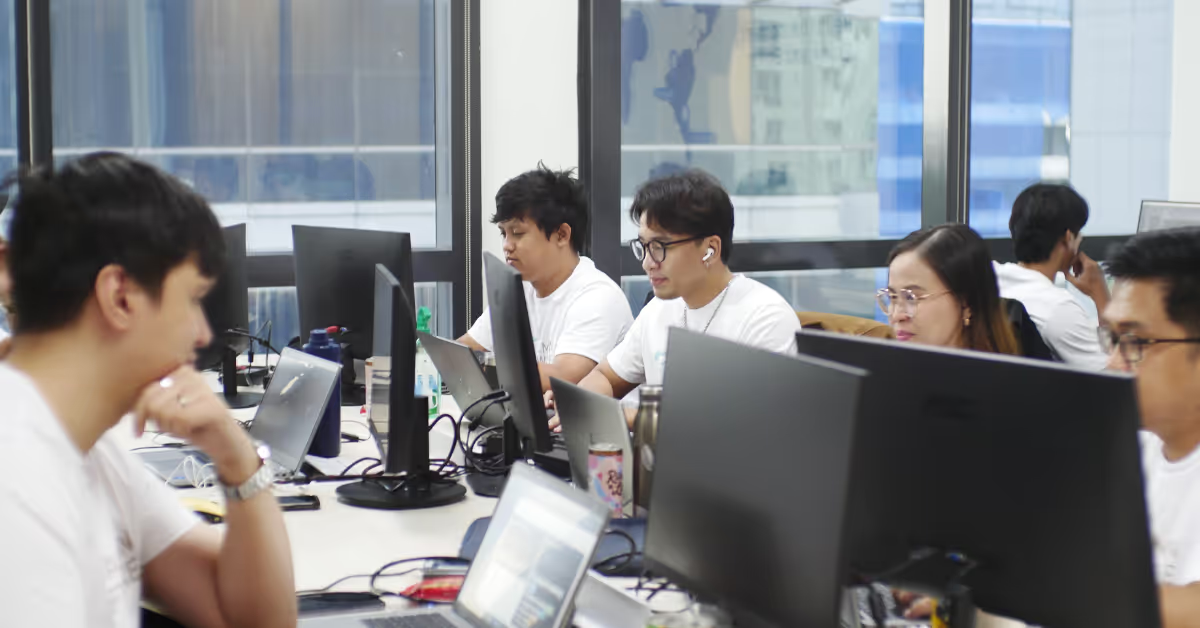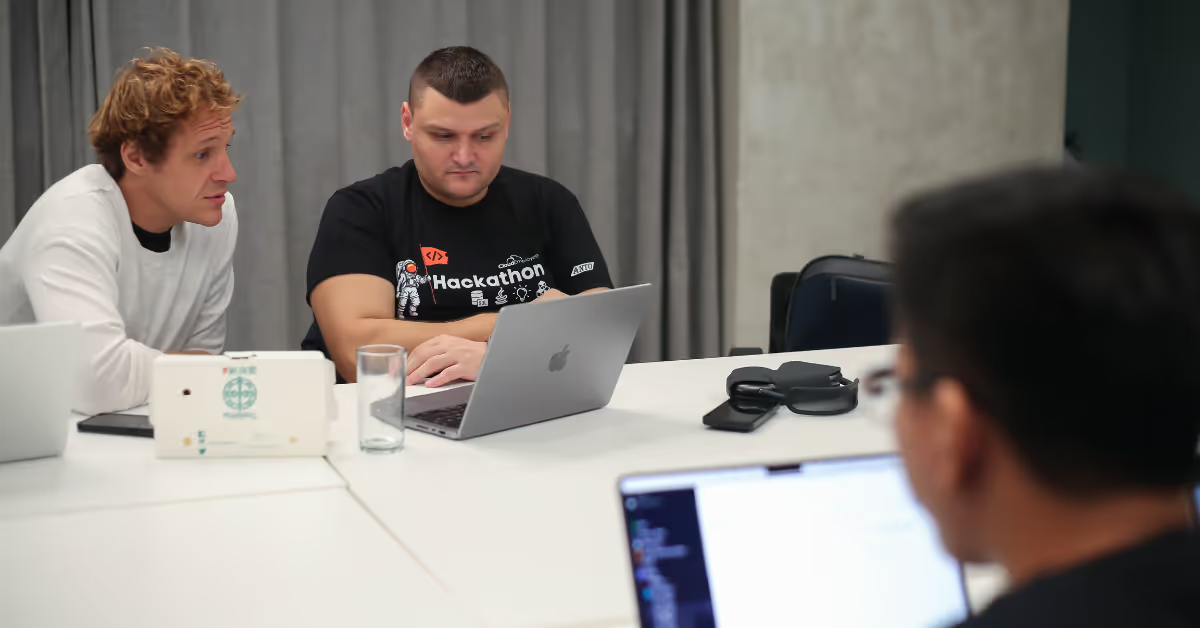Hiring Developers in the Philippines: Cost, Quality & Culture Fit for Outsourced Software Development

📌 TL;DR
The Philippines has evolved into a premier destination for software development outsourcing, remote staffing, and staff augmentation. It offers a rare blend of cost savings (often 50-70% lower than UK/USA roles), high technical proficiency, strong English skills, and cultural compatibility with Western businesses. While challenges remain; onboarding, quality control, retention - Cloud Employee’s process (CTO-led vetting process, embedded contracts, robust support) addresses them. For CTOs and CIOs exploring outsourcing to the Philippines, this article provides historical context, cost vs quality comparisons, benefits & risks, case evidence, and best practices to hire successfully in this booming offshore market.
A Hub Born from BPO, Raised in Innovation
The Philippines’ journey to offshore software development powerhouse began in the early 1990s. The first major shift came when Accenture (then under Frank Holz) opened its Global Resource Center in 1992 (asiateloutsourcing.com). Initially driven by voice-based Business Process Outsourcing (BPO) — call centers, customer support — the country leveraged its English proficiency, cultural alignment with the US/UK, and government incentives (via PEZA, among others) to scale rapidly.
Over time, the demand moved beyond voice and back-office services into knowledge process outsourcing (KPO): finance, legal, analytics. In recent years, software development outsourcing has grown in both volume and complexity. Big brands like Google, IBM, American Express, and many fast-growing tech startups have extended engineering, operations, data and design teams to the Philippines.
Cloud Employee, in working closely with thousands of Filipino developers over several years, has seen this evolution firsthand: developers not only with strong academic backgrounds in CS / engineering, but with experience in modern full-stack, cloud, mobile, DevOps, AI/ML, data engineering. They are now less “outsourced support” and more “remote development teams” in every sense. The remote staffing Philippines market has matured, and produced some of the world’s finest developers at all levels of ability. With this maturity, developers operate at the same or a higher level than USA/UK organisations and expertly maneuver agile practices, regular code review, CI/CD, test coverage, all while offering the benefits of async collaboration.
The once untapped potential of this talent-rich market is now a cornerstone of talent acquisition for leading global businesses leveraging remote and dedicated talent to boost capability and delivery.
Cost Efficiency: More Context Than Just Lower Rates
When people talk about offshore outsourcing in the Philippines, often the first thought is lower cost. But what does that really mean, and what else falls out of the picture?
- Base salary vs all-in cost: A developer in the US/UK typically carries high cost including salary, benefits, taxes, pension, healthcare/insurance, office (or remote stipends), equipment, hiring costs & ramp time. In the Philippines, many of those overheads are lower - salaries are relatively more affordable, benefits packages are more affordable, infrastructure is less expensive, but to do it well you still need to invest in on the ground support and retention initiative, good laptops and technology, and good connectivity.
- Savings magnitude: In Cloud Employee’s experience, total all-in costs for a senior full-stack developer are often 50-75% lower than hiring locally in UK/US for an equivalent role, when comparing similarly senior engineers, with similar expectations of code quality, tech stacks, and collaboration. Because the developer is employed locally (in the Philippines), but managed by the client, with HR, compliance, payroll handled by the provider, many of the hidden costs that kill offshore experiments are removed.
- Speed to productivity: The cost isn’t just monthly salary. It’s “time to value”, how long before a developer is fully productive, working in your codebase, matches your standards. This is often slower when hiring locally (market competition, redundancy, long notice periods). With remote staffing models (especially ones like staff augmentation via Cloud Employee), developers are already used to remote workflows, frequent async communication, overlapping timezones. That reduces ramp time.
- Risk of failure cost: Hiring the wrong engineer locally (or one overseas without good vetting) costs not just wages but rework, bugs, delays. A high quality vetting process (technical assessments, reference checks, cultural fit etc.) reduces this risk.
Quality: What Sets Filipino Developers Apart & How Cloud Employee Ensures It
Filipino Talent: Technical Depth & Cultural Fit
Having worked with thousands of software developers in the Philippines, Cloud Employee finds that top-tier Filipino devs often match or exceed global standards in:
- English communication, both written and verbal: They can participate in design discussions, code reviews, and client calls without translation friction.
- Adaptability & learning curve: Given exposure to global clients, they frequently work across modern frameworks (React, Node.js, Python, Go), cloud platforms (AWS, GCP, Azure), microservices, containers, DevOps, test-driven development.
- Cultural alignment: Many have studied or worked under Western-style education models; cultural norms (respect for process, collaboration, transparency) and even consumption of western media make for easier integration into UK/US teams.
What Cloud Employee Does to Ensure “Outsourced Software Developers Philippines” Deliver
- CTO-Led Vetting. Hiring & Technical Oversight: Cloud Employee’s CTO, Anto Čabraja, brings ten years of senior software development, and remote team leadership experience. He’s personally involved in defining what “technical proficiency” looks like in different roles, overseeing tech assessments, pair programming, code sample reviews and continuous improvement of hiring standards alongside our senior engineers and technical talent specialists.
- Embedding in client’s stack & processes: Cloud Employee doesn’t just “deliver code”, devs are integrated into your sprint rhythm, your tools, continuous integration pipelines, code review culture. This differentiates from many offshore/outsource models where the external team is siloed.
- Support, training & retention: Continuous learning, mental health/wellness initiatives, local HR compliance, and benefits are all part of the support. Engineers are not treated like contractors dropping in then out, but as long-term team members.
- Quality metrics & feedback loops: Clients report that CE devs are “not afraid to push back”, “proactive and positive”, “feel like part of the team”. These are high-order qualities that often differentiate successful outsourced software developers from those locked into vendor-style models.
A Quote from Anto (CTO) on the Market:
“In my years working with Filipino developers, I’ve repeatedly seen engineers who not only match western peers in technical skills, but often in reliability and innovation. The challenge isn’t finding devs who can code — it’s finding ones who can think, communicate, take ownership and grow. In the Philippines, with the right vetting, culture and support, those devs are plentiful.”
Anto Čabraja
CTO at Cloud Employee
How Different Is It vs Hiring in the UK or USA?
Locally in UK/USA, many companies pay double or more for equivalent tech capability. In contrast, outsourced software development Philippines allows scaling without “blowing the payroll” but demands attentiveness: hiring standards, work ethics, onboarding, management styles.
Why Clients Choose the Philippines & Why Many Models Fail (& Where Cloud Employee Shines)
Broader Benefits Beyond Cost
- Scalability & Flexibility: You can scale up a team fast for a project, then downsize (or shift roles) without the long term fixed costs of in-house hiring.
- Access to a Diversified Talent Pool: Not just junior devs: senior, mid, full-stack, backend, frontend, AI, mobile, DevOps etc. Many with experience serving international clients.
- Cultural Compatibility & English Proficiency: Reduces friction in communication, code review, documentation, stakeholder management.
- Operating in Timezones with Overlap: Philippines overlaps often well with Asian, Australasian, and US Pacific hours; some UK/EU overlap is standard. At Cloud Employee, our dedicated developers work in the same time zone as you. This helps synchronous meetings, pair programming sessions, etc.
- Retention (When Treated Right): Developers in Philippines often value stability, long-term relationships, and are responsive to support, growth opportunities, mentorship. Cloud Employee’s average retention rate is 2.7 years.
Why Many Remote Outsourcing/Offshore Models Fail
Many outsourcing and offshore models fall short because developers are never truly integrated. The common pitfalls include:
- Poor vetting → Talent passes the CV test but not the coding test, leading to inconsistent standards.
How we solve it: Every engineer is vetted through our CTO-led vetting process, including live pair programming, guaranteeing technical quality from day one. - Weak integration into workflows → Contractors sit on the sidelines, outside standups, tools, and daily processes.
How we solve it: Our talent success team ensuring they are embedded in your tools, attending standups and collaborating as if hired in-house. - Cultural misalignment → Offshore hires often feel disconnected, making collaboration clunky and morale fragile.
How we solve it: We recruit for cultural fit as well as skill, which is why 97% of our developers stay beyond two years with clients. - Little investment in support and retention → With no focus on L&D or welfare, churn erodes continuity.
How we solve it: Developers are supported by a Talent Success Manager, HR team, and L&D lead, ensuring career growth, wellbeing, and engagement. - Timezone isolation → Minimal overlap stalls collaboration and decision-making.
How we solve it: With hubs in LATAM, the Philippines, Croatia and more, we offer coverage aligned with UK and US time zones, ensuring effective overlap. - Compliance and payroll risks → Mismanaged contracts, benefits, or regulations create liabilities for clients.
How we solve it: Cloud Employee manages payroll, compliance, pensions, and benefits in full, giving clients peace of mind while scaling.
The difference is simple: where traditional models create friction, Cloud Employee integrates, delivering teams that perform as though they were in-house, but with the speed, scale, and cost efficiency only staff augmentation can provide.
Why Cloud Employee Often Triumphs
- Plug-and-play integration: Devs are sourced, embedded, and retained — as part of your team. No treating as external contractors.
- CTO-led vetting and technical oversight: Ensures you’re getting dedicated software developers who meet high standards.
- Transparent cost models: One monthly fee; legal, payroll, compliance, benefits, support built-in. Clients know what they pay; risk is lower.
- Fast hiring: Clients frequently have devs integrated within 2 weeks, not months.
- Strong retention focus: Through wellness, training, company culture, local HR; the 97%+ retention beyond 2 years (for many staff augmentation setups) is a differentiator.
- Cultural fit & communication first: Not just technical skills; emphasis on soft-skills, proactive communication, owning the work. Clients note that CE devs “feel like part of the team.”
Although they’re employed by Cloud Employee, the team here are a full part of Salmon. They are integral to what we’re doing over the next couple of years. For me, it’s key to make sure that harmony exists, that there is a great dynamic between all of our different offices.
Marcus Kilgour
CTO at Salmon Software
Challenges & How to Mitigate Them
Hiring developers in the Philippines is far from entirely smooth; there are hurdles. But with awareness and good strategy, you can largely avoid them.
Case Study: Willo & Cloud Employee
From the Willo customer story:
- What Willo needed: Rapid scaling of their development capacity without compromising quality.
- How Cloud Employee delivered: Provided fully embedded Filipino developers who joined Willo’s team, aligned with their tech stack, agile methodology, and product culture. Onboarding in weeks.
- Results:
- 10 developers hired over 4 years in the Philippines without visiting
- Initial requirement of 2 engineers sourced & onboarded in 3 weeks
- 825 estimated hours saved in recruitment
- 4 years of team support and developer training
Additionally, clients have said things like:
I feel like the talent that we’ve got in the team here actually outshines our CTO and our tech lead over in the UK because they’re so good… tasks are often finished before I can write another task.
Sean, Mercato CEO
We spent four months trying to hire in the US. We engaged Cloud Employee and had two full-time developers onboarded in one week. The guys have been working with us for two years and we’re now up to a team of six.
Mark Whitfield, Managing Director at Cameron Pearson (read review)
These stories highlight not just cost and speed, but quality, integration, and long-term retention.
Best Practices for CTOs & CEOs Considering Hiring Developers in the Philippines
If you are a tech decision-maker evaluating remote staffing options in the Philippines, software development outsourcing, or hiring dedicated software developers offshore, here are recommendations to increase your chance of success:
- Define your requirements clearly
Clarify what technical stack, seniority, domain expertise, and soft-skills you need. Are you looking for full stack, backend, mobile, DevOps? What languages, frameworks, tools? What level of autonomy? - Use a structured, CTO-led vetting process
Technical assessments, coding challenges, pair programming, reference checks. The vetting should also include communication style and culture fit (timezone availability, overlap, feedback preferences). - Embed developers in your processes from day one
Onboard them as part of your team: include them in stand-ups, code reviews, retrospectives. Ensure they have access to your documentation, tools, CI/CD, design systems. - Invest in developer growth & retention
Make sure there are opportunities for skill development, feedback, career path, recognition. Offer competitive benefits locally. Provide mentorship. Strong HR support helps. - Set up reliable infrastructure
Ensure hardware, internet, backups, time zone overlaps, synchronous & asynchronous communication are well supported. If remote, provide stipends or hardware as needed. - Start with pilot projects / probation periods
Before scaling, test with small projects to validate processes, working relationships, code quality, communication flow, before fully committing. - Plan for cultural alignment and communication norms
Spend time early aligning on feedback styles, decision making, ownership, escalation paths. Be explicit about expectations (code quality, tests, documentation). - Choose a partner who handles compliance, payroll, legal
To avoid surprises, use a trusted provider who takes care of local employment law, contracts, insurance and benefits. - Monitor outcomes, not just inputs
Don’t just look at hourly rates; track deliverables, velocity, developer retention, quality of code (bugs, CI/CD failures). Adjust if anything is not working.
Conclusion
For CTOs, CIOs, and product leaders seeking ways to scale engineering capacity without compromising quality (and without exploding cost) hiring developers in the Philippines offers one of the best options available in 2025 and beyond. The country has matured from a BPO / call centre hub into a robust provider of offshore software development Philippines, offering senior, well-trained, culturally aligned talent at a fraction of UK/USA cost.
Models that treat remote devs as second‐rate or strictly cost centres are becoming obsolete. The future lies in staff augmentation, remote staffing in the Philippines, and dedicated software developers who are embedded, accountable, and trusted as long-term team members.
Cloud Employee is among the providers doing this best. CTO-vetted talent, transparent cost models, strong retention, and deep experience working with Filipino devs. If you are considering outsourcing web development to the Philippines or hiring remote developers Philippines, the window is open. Do it with strategy, partners who care, and standards that match your expectations, and you’ll get not just cost savings, but real competitive advantage.
FAQs
The Philippines combines strong English skills, cultural compatibility with Western teams, and a large pool of skilled developers across full-stack, cloud, mobile, and AI/ML. This makes it one of the most cost-effective and reliable hubs for remote staffing.
Companies typically save 50–70% in total costs. Salaries, benefits, and overheads are lower, while developers still deliver at par with Western standards. Cloud Employee also removes hidden costs like compliance, payroll, and HR.
All developers go through CTO-led vetting with coding tests, pair programming, and cultural fit checks. Once hired, they integrate directly into your workflows (standups, code reviews, CI/CD), ensuring in-house level collaboration and output.
Unlike local hiring, which can take months, Cloud Employee often places vetted senior developers within weeks (not months), often in just one week depending on role needs.
hen supported with career growth and benefits, Filipino developers show high loyalty and long tenure. Cloud Employee’s retention rates exceed 97% beyond two years, helping teams maintain stability and continuity.






.avif)